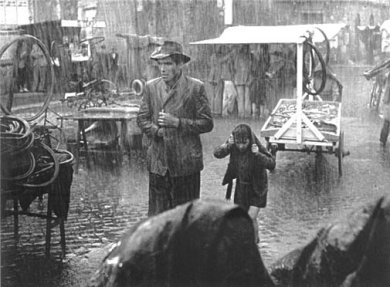Whatever title you use, I saw this film last Friday. It's in the Lists area as Bicycle Thieves, and I've learned that this was the original title. Netflix, and I think most American stores/rental houses/etc have it as The Bicycle Thief.
Putting aside artistic integrity or any other such notions, which title do you feel is better?
Personally, the second title ("The Bicycle Thief") strikes me as significantly better than the original. It feeds a new understanding into the film once you've seen it, whereas the former is more of a straight description.
Lovely film, by the way. Was stunned and pleased to learn that the lead actor, Lamberto Maggiorani, wasn't really an actor at all. I've learned that this is a hallmark of the neorealist genre, and in a sense it removes the idea that talent has anything to do with the performance, but in the end it was certainly a powerful depiction. I think Maggiorani is the best thing about the film.
But, I digress. I'd be interested to hear people's thoughts on the two titles, and/or the film in general.
Putting aside artistic integrity or any other such notions, which title do you feel is better?
Personally, the second title ("The Bicycle Thief") strikes me as significantly better than the original. It feeds a new understanding into the film once you've seen it, whereas the former is more of a straight description.
Lovely film, by the way. Was stunned and pleased to learn that the lead actor, Lamberto Maggiorani, wasn't really an actor at all. I've learned that this is a hallmark of the neorealist genre, and in a sense it removes the idea that talent has anything to do with the performance, but in the end it was certainly a powerful depiction. I think Maggiorani is the best thing about the film.
But, I digress. I'd be interested to hear people's thoughts on the two titles, and/or the film in general.

